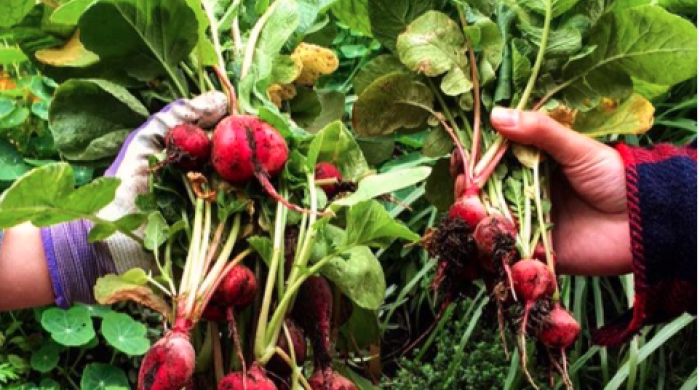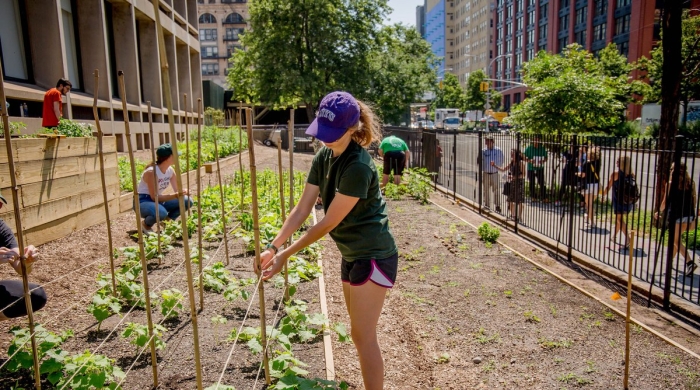After graduating with a master’s in Food Studies from the NYU Steinhardt Department of Nutrition and Food Studies in 2019, Dharath “Tot” Hoonchamlong moved back to his home country of Thailand to work as the Environmental Manager of Bo.lan, a sustainability-focused—and Michelin-starred—restaurant in Bangkok. We spoke with Tot to learn more about his current role and his experience as an international student at NYU.
Tot holding an armful of produce grown on the NYU Urban Farm Lab during his time in the Food Studies program.
Can you tell me a little bit about Bo.lan?
Bo.lan is a restaurant named after its owners, Duangporn Songvisava (Bo) and Dylan Jones (lan). Our mission is to share Thailand’s heritage and diversity of food culture and agriculture throughout the country and beyond while producing the least negative impact on the environment possible.
We strive for what we’d like to call a holistic approach to sustainability. For example, we grow and use organic produce from our edible garden and support local farmers and producers throughout Thailand. In the kitchen, chefs upcycle rice from the bottom of the pot into rice tea and a traditional dessert called Khao Tu, and extra vegetables and proteins that weren’t used to serve customers are repurposed into staff meals. We press citrus to make cleaning agents, and the peels and rinds are made into Effective Microorganisms (a substance that can be used to add nutrients to the soil, repel pests naturally, or clean).
We also work with suppliers to reduce their packaging, give them our compost for free, and collaborate on any potential actions that would create less waste in the end. One example is that our shrimp shells and eggshells are baked, blended, and given to our chicken supplier to feed their organic chickens.
What does your typical day look like as an Environmental Manager?
On non-operating days, I will be in the restaurant’s garden almost all day. Right now, I’m experimenting with amazing organic seeds we got from seed saving communities in various Thai provinces.
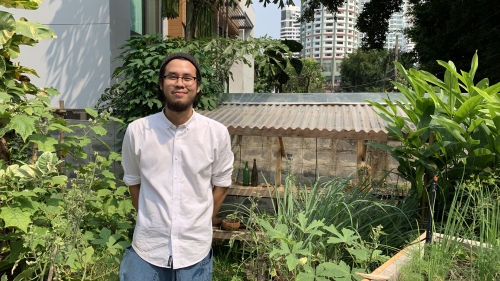
Tot standing in the Bo.lan Edible Garden.
I’m also researching how to grow certain plants to keep bugs and pests away from the outdoor area where customers gather to avoid using any repelling incense or spray.
On operating days, I make sure that I’ve done at least some garden work as time permits. The other hours are mostly filled with data collection or being in the kitchen getting input from the chef, staff, and suppliers on ideas I’d like to implement. I listen to their feedback on how practical an idea is and how it would affect their workflows. Sometimes these conversations help me crystalize the idea – or decide to scrap it completely. I also visit local farms and have meetings with people who might want to be a part of our sustainable ideas. It gives me optimism to connect with like-minded people who want to shape Thailand and the world under similar goals.
You mentioned that Bo.lan's garden reminds you of the NYU Urban Farm Lab. Did your experience on the Urban Farm shape your career path?
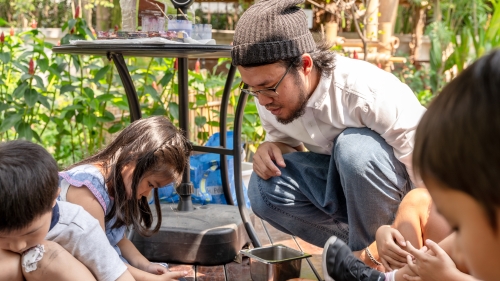
Tot hosting an educational sustainability and gardening workshop for children in the edible garden. Photo courtesy of Little Pea.
Bo.lan’s garden and the NYU Urban Farm Lab are both are in urban settings and share some similar main goals of growing for educational purposes and empowerment. My experience on NYU’s farm helped me feel more confident that Bo.lan’s garden will be able to be a part of the food system in Bangkok for the long term. It’s also fun to analyze and adapt knowledge about Western agriculture and community gardens in New York City to this side of the world while learning more about tropical crops and local varietals.
What was it like being an international student at NYU? Do you miss New York?
As an international student, I lived in New York for a brief scope of time and at a different pace than most of my fellow classmates. Being enrolled for a limited amount of time prompted me to manage my days even more efficiently, both at NYU and off campus.
I do miss New York, especially the people and certain places and foods. I returned to Bangkok because I felt like I had saturated myself for the time being – plus, what I want to learn and work on next is back here. It may just be me, but I think Bangkok and New York share a lot of similarities and both also have elements that the other doesn’t have.
About the MA in Food Studies
About the NYU Urban Farm Lab
Related Department
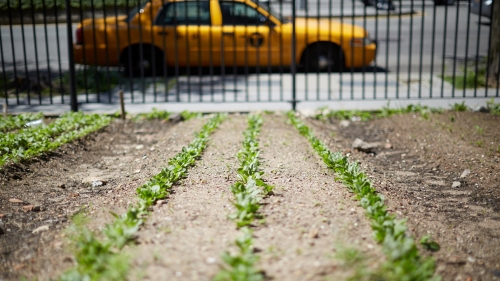
Nutrition and Food Studies
411 Lafayette Street, 5th Floor
New York, NY 10003
Phone: 212-998-5580
Email: nutrition@nyu.edu

